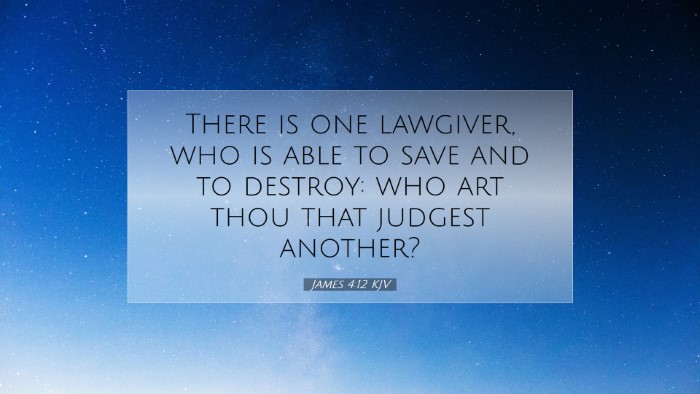Old Testament
Genesis Exodus Leviticus Numbers Deuteronomy Joshua Judges Ruth 1 Samuel 2 Samuel 1 Kings 2 Kings 1 Chronicles 2 Chronicles Ezra Nehemiah Esther Job Psalms Proverbs Ecclesiastes Song of Solomon Isaiah Jeremiah Lamentations Ezekiel Daniel Hosea Joel Amos Obadiah Jonah Micah Nahum Habakkuk Zephaniah Haggai Zechariah MalachiJames 4:12
James 4:12 KJV
There is one lawgiver, who is able to save and to destroy: who art thou that judgest another?
James 4:12 Bible Commentary
Commentary on James 4:12
Verse: "There is one lawgiver, who is able to save and to destroy: who art thou that judgest another?" (James 4:12, KJV)
Introduction
The book of James serves as a practical manual for Christian living, addressing issues of faith, behavior, and the importance of controlling one's tongue and actions. In James 4:12, James emphasizes the singular authority of God as the Lawgiver, contrasting this with the human tendency to judge one another. This commentary aims to explore the profound implications of this verse through the insights of notable public domain commentators.
Exegesis and Insights
-
Matthew Henry:
Henry indicates that the verse serves as a reminder of the divine authority of God and His prerogative as the Lawgiver. He states, "Only God, who is the sole lawgiver, has the right to judge, save, and destroy." This proclamation encourages humility among believers, as it positions God as the ultimate arbiter of justice and morality.
Henry further explores the notion that judging others can often arise from a misplaced sense of righteousness. He warns that such judgment is hypocritical when one is guilty of sin themselves, as it undermines the grace and mercy one has received from God.
-
Albert Barnes:
Barnes elaborates on the significance of the term "lawgiver," explaining that it highlights God's unique role in establishing moral and spiritual laws. He asserts, "As there is but one lawgiver, and as he has the power to save and to destroy, man should be cautious and humble." This illustrates the vast difference in authority between God and humankind.
Further, Barnes warns against the tendency of humans to assume the role of judge over others. He reminds readers that such actions can lead to division and strife within the Christian community, which is against the principles of love and unity that Christ taught.
-
Adam Clarke:
Clarke emphasizes the word "art thou" as a rhetorical question meant to invoke self-reflection. He posits that James challenges believers to consider their own position and the folly of presuming to judge others. According to Clarke, "It is to assume a role that belongs solely to God." This call to self-examination is a critical aspect of Christian maturity.
Moreover, Clarke interprets the phrase "who is able to save and to destroy" as a testament to God's sovereignty over life and death, emphasizing the importance of recognizing human limitations. He urges believers to focus on their own spiritual growth rather than passing judgment on fellow Christians.
Theological Themes
-
The Sovereignty of God:
All three commentators highlight the theme of God's sovereignty as central to this verse. Recognizing God as the sole lawgiver reinforces His authority and power over creation. This sovereignty implies that humans should recognize their place as created beings and refrain from overstepping their bounds.
-
The Call to Humility:
This verse serves as a significant reminder of the need for humility within the community of believers. Each commentator underscores the importance of viewing others through the lens of grace, rather than judgment. Embracing humility fosters a spirit of unity and love, in line with Christ’s teachings.
-
Judgment and Accountability:
James' admonition against judging others encapsulates the broader biblical theme of accountability. While the church is called to hold one another accountable, the application of judgment must be tempered with love and an awareness of personal shortcomings. God's role as judge reminds believers of their ultimate accountability to Him.
Practical Applications
-
Self-Examination:
Leaders and laity alike should routinely engage in self-examination, reflecting on their own actions and motivations before judging others. This practice can lead to greater compassion and understanding within the church community.
-
Promoting Unity:
Recognizing the authority of God encourages believers to work towards unity in Christ rather than division through judgment. Community leaders should foster environments where grace is extended, and diversity is celebrated.
-
Cultivating a Spirit of Grace:
Pastors and teachers should emphasize the importance of grace in relationships. By reflecting God's mercy towards one another, the church can model the character of Christ in tangible ways.
Conclusion
James 4:12 serves as a profound reminder of the need for humility, self-examination, and the recognition of God's sovereignty in our lives and communities. Through the insights provided by Matthew Henry, Albert Barnes, and Adam Clarke, we glean a deeper understanding of the call to reflect God's grace rather than exerting judgment over one another. As believers, let us strive to exemplify the love of Christ, leaving judgment in the hands of the one true Lawgiver.


